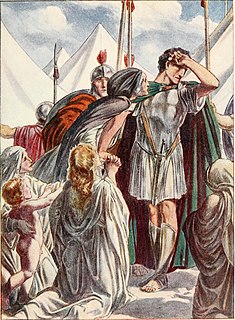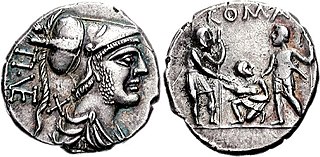Related Research Articles
The gens Tullia was a family at ancient Rome, with both patrician and plebeian branches. The first of this gens to obtain the consulship was Manius Tullius Longus in 500 BC, but the most illustrious of the family was Marcus Tullius Cicero, the statesman, orator, and scholar of the first century BC. The earliest of the Tullii who appear in history were patrician, but all of the Tullii mentioned in later times were plebeian, and some of them were descended from freedmen. The English form Tully, often found in older works, especially in reference to Cicero, is now considered antiquated.

The gens Julia was one of the most ancient patrician families in ancient Rome. Members of the gens attained the highest dignities of the state in the earliest times of the Republic. The first of the family to obtain the consulship was Gaius Julius Iulus in 489 BC. The gens is perhaps best known, however, for Gaius Julius Caesar, the dictator and grand uncle of the emperor Augustus, through whom the name was passed to the so-called Julio-Claudian dynasty of the first century AD. The nomen Julius became very common in imperial times, as the descendants of persons enrolled as citizens under the early emperors began to make their mark in history.

The gens Junia was one of the most celebrated families of ancient Rome. The gens may originally have been patrician, and was already prominent in the last days of the Roman monarchy. Lucius Junius Brutus was the nephew of Lucius Tarquinius Superbus, the seventh and last King of Rome, and on the expulsion of Tarquin in 509 BC, he became one of the first consuls of the Roman Republic.
Appius Claudius Sabinus Regillensis or Inregillensis was the legendary founder of the Roman gens Claudia, and consul in 495 BC. He was the leading figure of the aristocratic party in the early Roman Republic.

The gens Marcia, occasionally written Martia, was one of the oldest and noblest houses at ancient Rome. They claimed descent from the second and fourth Roman Kings, and the first of the Marcii appearing in the history of the Republic would seem to have been patrician; but all of the families of the Marcii known in the later Republic were plebeian. The first to obtain the consulship was Gaius Marcius Rutilus in 357 BC, only a few years after the passage of the lex Licinia Sextia opened this office to the plebeians.
The gens Gegania was an old patrician family at ancient Rome, which was prominent from the earliest period of the Republic to the middle of the fourth century BC. The first of this gens to obtain the consulship was Titus Geganius Macerinus in 492 BC. The gens fell into obscurity even before the Samnite Wars, and is not mentioned again until the final century of the Republic.

The gens Veturia, originally Vetusia, was an ancient patrician family of the Roman Republic. According to tradition, the armourer Mamurius Veturius lived in the time of Numa Pompilius, and made the sacred ancilia. The Veturii occur regularly in the Fasti Consulares of the early Republic, with Gaius Veturius Geminus Cicurinus holding the consulship in 499 BC. Like other old patrician gentes, the Veturii also developed plebeian branches. The family declined in the later Republic, with the last consular Veturius holding office in 206 BC, during the Second Punic War.
Sextus Julius Caesar was a Roman praetor in 208 BC, during the Second Punic War. He is thought to be the ancestor of all of the later Julii Caesares who appear in history.
Gaius Julius Iullus was a Roman statesman, who held the consulship in 482 BC. After a contentious election, he was chosen to represent the more moderate faction in Roman politics, while his colleague, Quintus Fabius Vibulanus, was elected by the aristocratic party. Both consuls led a Roman army against Veii, but withdrew when the Veientes refused to confront them. Thirty years later, in 451, Julius was chosen a member of the first decemvirate, alongside several other ex-consuls and other respected statesmen. Julius proved himself a man of good judgment and integrity, and helped to draw up the first ten tables of Roman law.
Vopiscus Julius Iullus was a Roman statesman, who held the consulship in 473 BC, a year in which the authority of the Roman magistrates was threatened after the murder of a tribune of the plebs.
Gaius Julius Iulus was consul in 447 BC, and again in 435.
Lucius Julius Iullus was a member of the ancient patrician gens Julia. He was one of the consular tribunes of 438 BC, magister equitum in 431, and consul in 430 BC.
Gaius Julius Iullus was a Roman statesman and member of the ancient patrician gens Julia. He was consular tribune in 408 and 405 BC, and censor in 393.
Gaius Julius Iulus was a member of the Roman gens Julia, and was nominated dictator in 352 BC.
Gaius Julius Mento was a member of the ancient patrician gens Julia, who held the consulship in BC 431.
The gens Genucia was a prominent family of the Roman Republic. It was probably of patrician origin, but most of the Genucii appearing in history were plebeian. The first of the Genucii to hold the consulship was Titus Genucius Augurinus in 451 BC.
The gens Nautia was an old patrician family at ancient Rome. The first of the gens to obtain the consulship was Spurius Nautius Rutilus in 488 BC, and from then until the Samnite Wars the Nautii regularly filled the highest offices of the Roman Republic. After that time, the Nautii all but disappear from the record, appearing only in a handful of inscriptions, mostly from Rome and Latium. A few Nautii occur in imperial times, including a number who appear to have been freedmen, and in the provinces.
The gens Numicia was an ancient patrician family at Rome. The first of the Numicii to appear in history was Titus Numicius Priscus, consul in 469 BC. Later members of the family were plebeian. Members of this gens are first mentioned down to imperial times, and the nomen Numicius is regularly confused with Numisius, which was probably nothing more than a different form of the same gentile name.
The gens Publilia, sometimes written Poblilia, was a plebeian family at ancient Rome. Members of this gens are first mentioned in the early decades of the Republic. The lex Publilia passed by Volero Publilius, tribune of the plebs in 471 BC, was an important milestone in the struggle between the patrician and plebeian orders. Although the Publilii appear throughout the history of the Republic, the family faded into obscurity around the time of the Samnite Wars, and never again achieved positions of prominence in the Roman state.
Sextus Julius Iulus was a consular tribune of the Roman Republic in 424 BC.
References
- 1 2 3 4 5 Dictionary of Greek and Roman Biography and Mythology, vol. II, p. 656, 657.
- ↑ Dionysius, viii. 1–13.
- 1 2 Plutarch, "The Life of Coriolanus", 26–28.
- ↑ Livy, ii. 37, 38.
- 1 2 Broughton, vol. I, p. 18.
- ↑ Dionysius, viii. 14–16.
- ↑ Livy, ii. 39.
- ↑ Broughton, vol. I, p. 19.
- ↑ Corpus Inscriptionum Latinarum , vol. I, p. 16.
- ↑ Broughton, vol. I, pp. 23, 29.
- ↑ Griffin, p. 13.